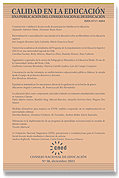Academic Trajectories of PACE Program Students in a Chilean Regional University
DOI:
https://doi.org/10.31619/caledu.n59.1383Keywords:
Higher Education, Academic Pathways, University Adaptation, First Generation Students, HabitusAbstract
Educational policies have positioned higher education (HE) as a competitive arena, emphasizing prestige and quality. This orientation has created challenges for access, adaptation, and retention of students, particularly those from economically disadvantaged backgrounds. In Chile, the Accompaniment Program in Higher Education (PACE) has been a proactive step to address this disparity, offering academic and financial support to historically marginalized students seeking higher education. This study seeks to reconstruct the academic journeys of PACE Program-supported students at a regional university in northern Chile. It does so by describing the significant milestones, barriers, and facilitating factors in their educational pathways. A qualitative case study methodology was used, with a focus on Pierre Bourdieu's theory of social reproduction. The main findings highlight how students percieve HE as a means of achieving social mobility, even in the face of considerable obstacles, including economic constraints, inadequate academic preparedness, expectations set during secondary education, and self-debout regarding their abilities. Conversely, facilitators include government policies and assistance, dedicated teacher support, family connections, and personal qualities such as determination and resilience. These findings provide valuable insights to inform initiatives aimed at restoring equitable access to education for students from economically disadvantaged backgrounds.
Downloads
Published
Issue
Section
License
Copyright (c) 2023 Calidad en la Educación

This work is licensed under a Creative Commons Attribution 4.0 International License.
Authors retain their Copyright and only transfer a part of these to the journal, accepting the following conditions:
Authors keep their rights as authors and guarantee the right to the journal for the first publication of their work, which is simultaneously subject to the Creative Commons Attribution license allowing third parties to share the study accrediting the author and first publication in this journal.
Authors may adopt other non-exclusive license agreements for distribution of the version of the published work (e.g. inclusion in an institutional thematic file or publication in a monographic volume) accrediting initial publication in this journal.
Authors are allowed and recommended to share their work over the Internet (e.g. in institutional telematic files or their website) before and during the submission process, which may lead to interesting exchanges and increased citation of the published work. (See The effect of open access).

